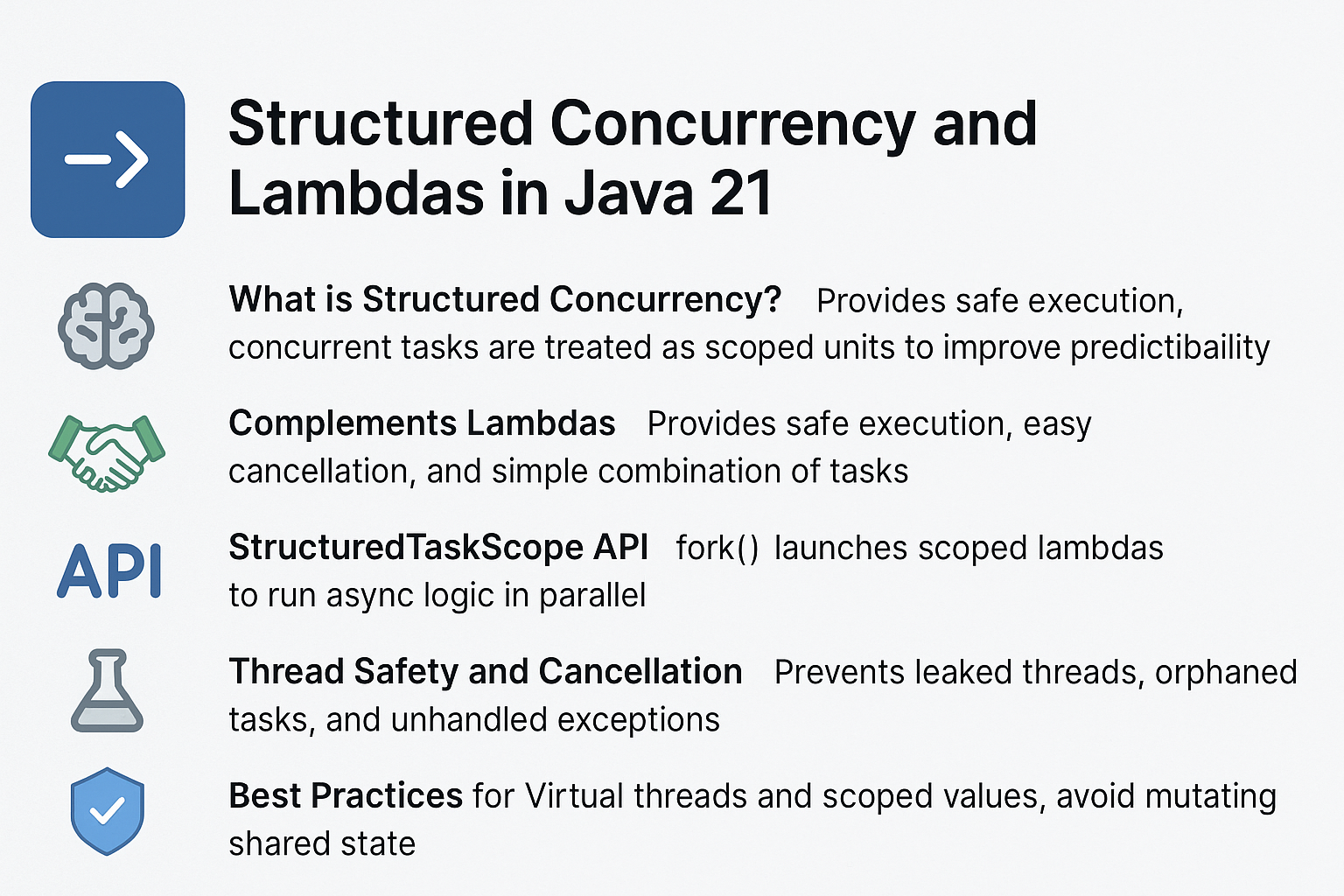Concurrency in Java is getting a modern upgrade. With structured concurrency introduced in Java 21, you can now manage tasks more safely and cleanly—especially when combined with lambdas and virtual threads.
In this guide, you'll learn what structured concurrency is, how it fits into the Java lambda ecosystem, and how to use it for real-world async programming without callback hell, resource leaks, or thread chaos.
🧠 What Is Structured Concurrency?
Structured concurrency treats concurrent tasks as scoped units of work—like local variables. If the scope exits, the tasks are canceled. It avoids the pitfalls of unstructured threads and makes concurrency predictable and safe.
Java 21 introduces this under java.util.concurrent.StructuredTaskScope.
🤝 How Structured Concurrency Complements Lambdas
Lambdas make task logic modular and composable. Structured concurrency makes them safe to launch, easy to cancel, and simple to combine.
With structured scopes, lambdas can be used as lightweight tasks that return values or propagate exceptions—all without complex management code.
✅ StructuredTaskScope in Action
1. Run Multiple Tasks in Parallel
try (var scope = new StructuredTaskScope.ShutdownOnFailure()) {
Future<String> user = scope.fork(() -> fetchUser());
Future<List<Order>> orders = scope.fork(() -> fetchOrders());
scope.join(); // Wait for both to finish
scope.throwIfFailed(); // Propagate any exception
String result = user.result() + " - " + orders.result();
System.out.println(result);
}
Functional Benefit: Each fork() uses a lambda (Callable<T>) to describe the work. You get composable async logic with clean control flow.
⚙️ Combining Structured Concurrency with Functional Interfaces
You can inject lambdas into fork() using:
Callable<T>— returns a resultRunnable— performs a taskSupplier<T>— for deferred computation
Example:
Function<String, String> shout = name -> name.toUpperCase();
try (var scope = new StructuredTaskScope.ShutdownOnFailure()) {
Future<String> task = scope.fork(() -> shout.apply("java"));
scope.join();
System.out.println(task.result()); // JAVA
}
🧪 Thread Safety and Cancellation
Structured concurrency ensures:
- Cancelation if any task fails
- No leaked threads or orphaned tasks
- Exception propagation and scoped cleanup
🔁 Functional Pipelines with Structured Tasks
Imagine filtering, transforming, or aggregating data concurrently:
try (var scope = new StructuredTaskScope.ShutdownOnFailure()) {
List<String> items = List.of("a", "b", "c");
List<Future<String>> futures = items.stream()
.map(item -> scope.fork(() -> item.toUpperCase()))
.toList();
scope.join();
List<String> results = futures.stream()
.map(Future::result)
.toList();
System.out.println(results); // [A, B, C]
}
🚀 Real-World Use Cases
- API aggregation (fetching multiple microservice results)
- Concurrent I/O operations (read/write, parse, transform)
- Async image processing, file uploads, or background jobs
- Functional-style batch pipelines using
Function,Predicate,Consumer
📌 What's New in Java Versions?
Java 8
- Lambdas, Streams, CompletableFuture
Java 11
varin lambda parameters, improved Optional, local type inference
Java 17
- Sealed classes, enhanced switch, better pattern matching
Java 21
- ✅ Structured concurrency (
StructuredTaskScope) - ✅ Virtual threads
- ✅ Scoped values
- ✅ Improved lambda/thread compatibility
🔒 Best Practices for Structured Concurrency with Lambdas
- ✅ Use meaningful names for lambda logic (
Function,Supplier) - ✅ Prefer virtual threads (default in structured scopes)
- ✅ Don’t mutate shared state inside lambdas
- ✅ Catch and handle exceptions properly (
throwIfFailed())
⚠️ Anti-Patterns to Avoid
- ❌ Launching tasks outside scopes (
new Thread(...)) - ❌ Ignoring
scope.join()orthrowIfFailed() - ❌ Writing deeply nested lambda chains in
fork()bodies - ❌ Using ThreadLocal in structured tasks (prefer
ScopedValue)
🧱 Functional Patterns with Structured Concurrency
- Command pattern: Forked lambdas executing actions
- Pipeline pattern: Launch async transformations
- Orchestration pattern: Compose multiple results with clear cancellation
🔄 Refactoring Example
Before (Unstructured Concurrency)
ExecutorService pool = Executors.newFixedThreadPool(2);
Future<String> user = pool.submit(() -> fetchUser());
Future<List<Order>> orders = pool.submit(() -> fetchOrders());
After (Structured + Functional)
try (var scope = new StructuredTaskScope.ShutdownOnFailure()) {
Future<String> user = scope.fork(() -> fetchUser());
Future<List<Order>> orders = scope.fork(() -> fetchOrders());
scope.join();
scope.throwIfFailed();
}
✅ Conclusion and Key Takeaways
- Java 21’s structured concurrency makes multithreaded lambdas safer, cleaner, and cancelable
- Combine lambdas with structured scopes to manage async logic like local variables
- Use
fork()+Callable/Supplierlambdas for concurrent value generation - Prefer virtual threads and scoped values for performance and context safety
❓ FAQ
1. What is structured concurrency?
A way to treat concurrent tasks like structured code blocks—scoped and managed together.
2. Do I need to use virtual threads?
No, but they are the default and ideal for structured concurrency.
3. What if one task fails in a structured scope?
All other tasks are canceled automatically.
4. Can I use structured concurrency with legacy thread pools?
No. StructuredTaskScope manages its own threads.
5. Are lambdas reusable across structured scopes?
Yes—especially if written as pure functions (Function, Supplier, etc.)
6. Can I fork hundreds of lambdas?
Yes—when using virtual threads, it scales well.
7. Is StructuredTaskScope production-ready?
Yes, available as stable in Java 21.
8. Should I use CompletableFuture or structured concurrency?
Structured concurrency offers better readability and scoping.
9. Can I return data from forked lambdas?
Yes. Use Callable<T> and get results from Future<T>.
10. How is this better than manually managing threads?
You don’t need to track or clean up threads—Java does it safely for you.
